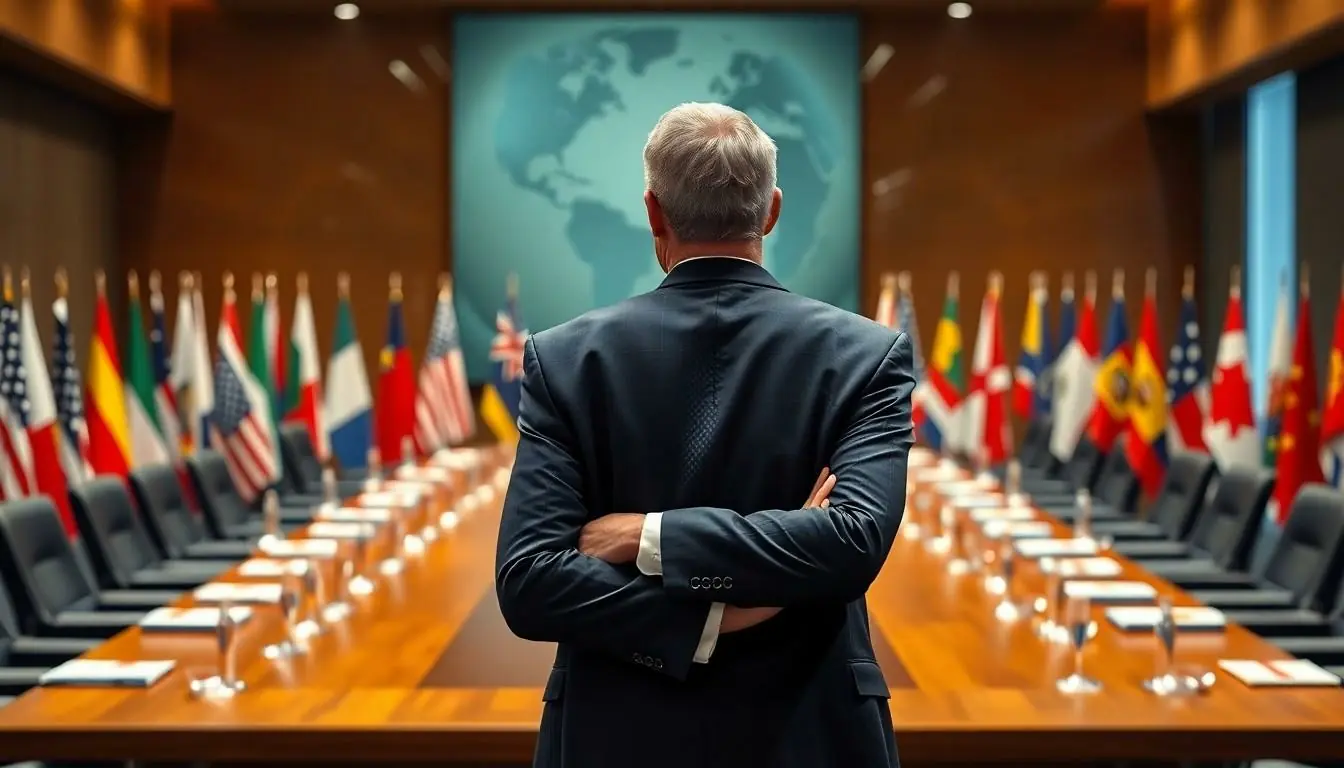Table of Contents
ToggleIn a world that feels more connected than ever, understanding the essentials of international relations isn’t just for diplomats and scholars. It’s for anyone who wants to navigate the complex web of global affairs without getting lost in translation. Imagine trying to make friends at a party where everyone speaks a different language—awkward, right? That’s the reality of international relations, where cultural nuances and political agendas can turn a simple handshake into a diplomatic incident.
Overview of International Relations
Understanding the complexities of international relations is crucial in today’s interconnected world. Global affairs involve the interactions of countries, organizations, and non-state actors. Several key factors influence these relationships, including political agendas, economic interests, and cultural differences.
Political agendas drive state behavior on the international stage. Countries engage in diplomacy to advance their national interests, often competing for power and influence. Economic interests also play a significant role, as trade agreements and resource allocation impact global stability and cooperation.
Cultural differences add another layer of complexity. Misunderstandings often arise from varying cultural norms and values. Successful engagement requires not only language proficiency but also an appreciation for diverse perspectives. Countries that cultivate strong cultural awareness often achieve better diplomatic outcomes.
International organizations contribute to managing relationships between states. Institutions like the United Nations and NATO facilitate cooperation, conflict resolution, and peacekeeping efforts. These organizations establish frameworks for dialogue and negotiation, helping to mitigate tensions among nations.
Global issues like climate change, terrorism, and pandemics transcend borders. Collaborative solutions require countries to share resources, knowledge, and strategies. Addressing these challenges demands multilateral cooperation, underscoring the importance of maintaining open lines of communication and trust.
Balancing national interests with global responsibilities is paramount in international relations. By prioritizing negotiation and mutual understanding, countries can navigate the complexities of the international system. Effective engagement fosters stability and promotes a more peaceful world.
Key Theories in International Relations

Understanding key theories in international relations provides insights into global interactions. These theories explain behavior among states and the dynamics of their relationships.
Realism
Realism focuses on power and national interest as the primary factors driving international relations. States act primarily in their self-interest and seek to maximize their power. Security concerns dominate the realist perspective, believing that anarchy in the international system leads to competition and conflict. Historical examples illustrate this, such as power struggles during the Cold War. Realists emphasize military strength, which serves as a deterrent against threats. Trust between nations often remains low, as states prioritize security over cooperation.
Liberalism
Liberalism highlights the significance of interdependence and cooperation among states. Unlike realism, this theory views international relations as shaped by institutions, norms, and shared interests, suggesting that states can achieve mutual benefits through collaboration. Trade relationships and international organizations, like the World Trade Organization, exemplify liberal principles in action. Liberals argue that democracies are less likely to go to war with one another, promoting peace through shared values. Ultimately, liberalism underscores the importance of diplomacy and dialogue in resolving conflicts and fostering global stability.
Constructivism
Constructivism centers on the social construction of international relations, emphasizing ideas and identities over mere material factors. This theory posits that state behavior is influenced by historical contexts and societal norms. Constructivists argue that language, culture, and ideology shape how states perceive each other. For example, changes in narrative can lead to shifts in relationships, as seen in post-apartheid South Africa. Understanding identities and interactions is essential for comprehending global issues. Constructivism encourages a deeper examination of how perceptions impact international affairs.
Major Actors in International Relations
Understanding the major actors in international relations is crucial for navigating global affairs effectively. These actors play distinct yet interconnected roles in shaping international dynamics.
States
States serve as primary actors in international relations. Each state pursues its own national interests, often focusing on security, economic stability, and political influence. They engage in diplomacy to form alliances, negotiate treaties, and address conflicts. Some states prioritize power, aiming to expand their influence through competitive strategies. Others may emphasize cooperation and collaboration to achieve mutual benefits. The actions of states can significantly impact global stability, highlighting their centrality in international interactions.
International Organizations
International organizations facilitate cooperation among states and address global challenges. Key examples include the United Nations and NATO, which play vital roles in peacekeeping and conflict resolution. These organizations enable member states to collaborate on issues like climate change, humanitarian efforts, and security threats. They provide platforms for dialogue, allowing states to express concerns and find common ground. Additionally, international organizations often set norms and standards that guide state behavior, making their influence significant in shaping international relations.
Non-State Actors
Non-state actors, including multinational corporations, NGOs, and civil society groups, increasingly influence international relations. They often advocate for specific issues like human rights, environmental standards, and economic development. Multinational corporations can impact trade policies and economic relationships among states. NGOs mobilize public opinion and provide humanitarian assistance, often filling gaps in state responses. Civil society groups contribute to advocating for transparency and accountability. As these actors gain prominence, their roles become essential in shaping the global landscape.
Global Issues in International Relations
Global issues play a significant role in shaping international relations. Understanding these challenges is crucial for nations seeking to navigate the complexities of the global landscape.
Conflict and Security
Conflict and security issues fundamentally influence international relations. Nations prioritize national security to protect their sovereignty and interests. Tensions often arise from territorial disputes, ethnic tensions, and resource competition. The ramifications of conflicts extend beyond borders, as they can lead to humanitarian crises and instability. NATO and other alliances address security through collective defense agreements and strategic partnerships. Negotiating peace treaties becomes essential to de-escalate conflicts and foster stability in volatile regions. Countries that invest in conflict resolution mechanisms contribute to long-term peace and security.
Trade and Economics
Trade and economics serve as the backbone of international relations. Countries engage in trade agreements to enhance economic growth and stability. Economic interdependence can reduce the likelihood of conflicts by creating mutual benefits. Tariffs and trade barriers often disrupt these relationships, leading to economic tensions. Global supply chains illustrate the interconnectedness of economies, where local decisions have global repercussions. Organizations like the World Trade Organization influence trade policies and promote fair practices. Economic cooperation among nations facilitates development and can address disparities that lead to conflicts.
Human Rights and Humanitarian Issues
Human rights and humanitarian issues remain central to international relations. Nations grapple with violations that can lead to international condemnation or intervention. Humanitarian crises, such as refugee movements, challenge states to respond effectively. NGOs and intergovernmental organizations often spearhead efforts to address these issues. Promoting human rights can enhance a nation’s global standing and foster diplomatic relationships. Cultural awareness is essential in these discussions, as respect for local traditions can improve humanitarian efforts. Champions of human rights can influence international policies, shaping a more equitable global framework.
Emerging Trends in International Relations
Emerging trends in international relations significantly shape global interactions. Awareness of these trends is crucial for understanding contemporary dynamics.
Globalization
Globalization increasingly influences international relations by accelerating cultural, economic, and political exchanges. Nations connect through trade agreements, technology, and cultural exchanges. Economic interdependence emerges as countries collaborate on issues like supply chain management. Enhanced communication methods facilitate real-time interactions, allowing for swift responses to geopolitical events. This interconnectivity can lead to both enhanced cooperation and heightened tensions. In dealing with global challenges, states must navigate diverse interests while maintaining their identities. Awareness of these complexities is vital for effective diplomacy and fostering mutual understanding.
Environmental Challenges
Environmental challenges are critical in shaping international relations. Climate change poses significant risks, prompting countries to collaborate on sustainable solutions. Nations face increasing pressure to develop policies addressing environmental degradation and resource depletion. Global agreements, such as the Paris Accord, exemplify cooperative efforts to combat climate change. Negotiations and agreements often reflect the varying capacities and needs of individual countries. Cooperation on environmental issues fosters trust and enhances diplomatic relationships. Addressing these challenges requires collective action for a more sustainable future, influencing diplomatic agendas worldwide.
Understanding the essentials of international relations is vital for anyone engaged in today’s interconnected world. The complexities of global affairs require a keen awareness of cultural nuances and political dynamics. As nations navigate their interests while addressing shared challenges, effective communication and cooperation become paramount.
The interplay between states, international organizations, and non-state actors shapes the landscape of global interactions. With emerging trends like globalization and environmental challenges, the need for collaboration and mutual understanding is more pressing than ever. By fostering these relationships, countries can work towards a more stable and peaceful future.


